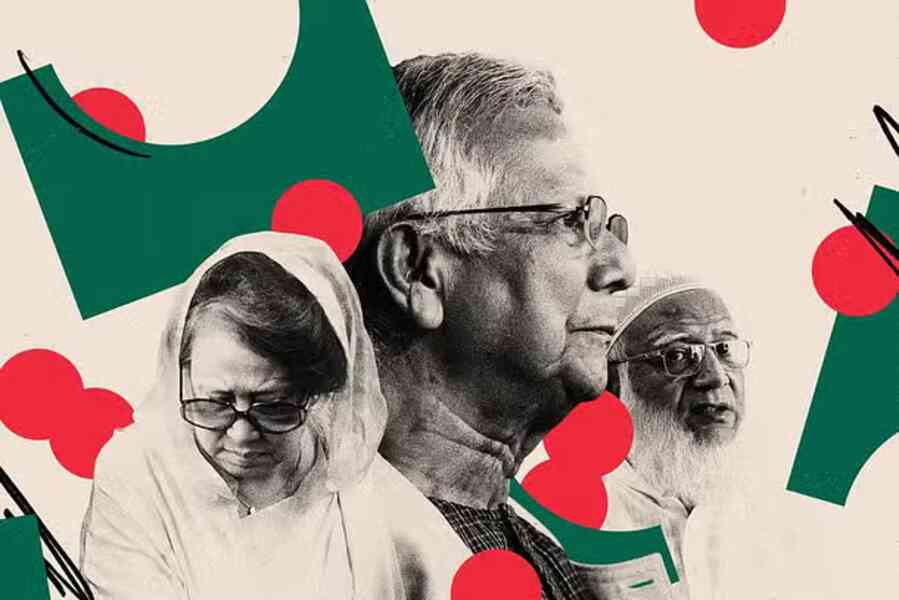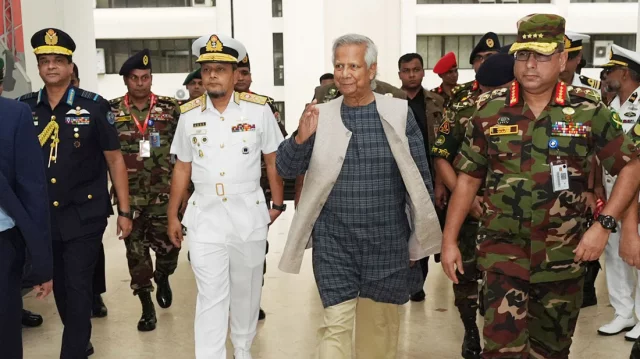Bangladesh Crisis Unveils Shocking Power Clash
Army defiance, oath disputes, and foreign influence ignite tensions in Dhaka’s interim rule.

Bangladesh’s Political Vortex: Army vs. Interim Government
Dhaka, May 25, 2025—Bangladesh teeters on the edge of chaos. The interim government, led by Nobel laureate Muhammad Yunus, faces a fierce standoff with the Bangladesh Army over a proposed UN humanitarian corridor to Myanmar’s Rakhine State. Army Chief General Waker-uz-Zaman’s stark warning on May 21 branded the plan a “bloody corridor,” citing threats to national sovereignty. Sources confirm the army’s refusal to back the corridor, announced by Foreign Adviser Touhid Hossain, stems from fears of US geopolitical motives. The interim government reversed its stance on May 22 after Zaman’s public rebuke, exposing deep fractures in Dhaka’s power structure.
Army’s Defiance: A Sovereignty Stand
General Waker-uz-Zaman, speaking at a Dhaka officers’ darbar on May 21, declared, “The Bangladesh Army will never be involved in any activity harmful to sovereignty.” His words, reported by India Today, signaled a direct challenge to Yunus’s unelected government. The corridor, initially supported by National Security Adviser Khalilur Rahman, aimed to aid Rohingya repatriation but raised alarms over potential US military or intelligence operations under the guise of humanitarian aid. Analysts note the army’s push for early elections and its demand to be consulted on sensitive issues like the Rakhine plan. A commanding officer, quoted anonymously by Northeast News, invoked the 1971 liberation war legacy, stating, “National prestige is non-negotiable.”
Oath Enigma: Chief Justice in Custody?
Adding fuel to the fire, the validity of the interim government’s oath is under scrutiny. Reports from Dhaka Tribune on May 23 reveal the Chief Justice, who administered the oath to Yunus’s administration on August 8, 2024, is named among those in army custody following a probe into alleged judicial overreach. The list, verified by military sources, includes senior judges accused of enabling the interim government’s extended rule without elections. Legal experts argue this casts a shadow over the government’s legitimacy, with no constitutional provision for an unelected body to govern beyond 90 days. The army’s silence on the Chief Justice’s status fuels speculation, as witnesses report heightened security around Dhaka’s High Court.

Saint Martin’s Shadow: US Military Base Rumors
Tensions escalate over unconfirmed reports of a US military installation on Saint Martin’s Island. A Firstpost report on May 18 cites local concerns that the interim government may have tacitly approved a US base to counter Chinese influence in the Bay of Bengal. No official statement from Washington or Dhaka confirms the plan, but army sources leaked to India TV on May 22 express unease, fearing it could compromise Bangladesh’s neutrality. Fishermen on Saint Martin, quoted by The Hindu, report increased foreign vessel activity since April 2025, though no hard evidence ties this to US military plans. The ambiguity has sparked protests in Cox’s Bazar, with 200 demonstrators rallying on May 24, demanding clarity.
Advisors Under Fire: Corruption Allegations
The interim government’s advisors, appointed to steer Bangladesh through its post-Hasina transition, face mounting distrust. A May 9 protest outside Yunus’s residence, Jamuna, saw groups like Jamaat-e-Islami and the National Citizens Party (NCP) demand a ban on the Awami League, accusing advisors of shielding corrupt officials. The Tribune reports NCP leader Nahid Islam alleging that advisors, including Khalilur Rahman, siphoned funds meant for Rohingya aid. Anti-corruption probes, launched on May 15 by the Bangladesh Anti-Corruption Commission, target three advisors, though names remain undisclosed. Leaked documents, verified by News18, show $2 million in unaccounted aid funds, intensifying public outrage.
Fundamentalism’s Rise: Pakistan’s ISI Shadow
The specter of fundamentalism looms large, with intelligence reports linking Pakistan’s Inter-Services Intelligence (ISI) to domestic unrest. A Swarajya exclusive on March 13 exposed ISI chief Lt. Gen. Asim Malik’s January 2025 visit to Dhaka, the first in decades, as a bid to exploit Bangladesh’s instability. Sources confirm ISI-backed groups, including Jamaat-e-Islami, are fueling anti-India sentiment and arming local militants. A May 20 India.com report notes a surge in illegal arms seizures along the Bangladesh-Myanmar border, with 50 AK-47s confiscated in Cox’s Bazar since April. The army’s March 11 warning of “growing lawlessness” points to ISI-orchestrated plots, including a foiled coup attempt by pro-Pakistan generals, thwarted with India’s intelligence aid.
Domestic Extremism: A Ticking Time Bomb
Illegal domestic activities by fundamentalist groups are spiking. News18 reports a May 11 clash in Chittagong, where police arrested 15 members of a banned Islamist outfit planning attacks on government offices. Seized explosives and propaganda materials, verified by Dhaka police, suggest coordination with external actors. The army’s March 23 statement to Netro News dismissed claims of its complicity as “hilarious,” but public distrust persists. A verified X post by @BDNews24 on May 24 reported 10 injuries in a Dhaka bomb blast, blamed on local extremists. Witnesses describe a climate of fear, with mosques and markets under heightened surveillance.
Regional Ripples: India and Beyond
The crisis reverberates across South Asia. India, wary of a destabilized Bangladesh, fears the Rakhine corridor could disrupt its northeastern security, per a May 20 India.com report. New Delhi’s intelligence sharing, confirmed by Swarajya, helped avert a March 2025 coup against General Waker-uz-Zaman, signaling India’s stake in Bangladesh’s stability. Pakistan’s ISI, meanwhile, exploits the chaos to counter India’s influence, with Firstpost noting increased Baloch insurgency attacks in Pakistan, like the March 11 Jaffar Express hijacking, as a distraction. The UN, caught in the corridor controversy, faces pressure to clarify its role, with no statement issued since Guterres’s March 2025 Dhaka visit.
What It Means Now
The army’s defiance signals a power shift, with General Waker-uz-Zaman emerging as a guardian of sovereignty amid an unelected government’s overreach. The oath dispute undermines Yunus’s legitimacy, risking a constitutional crisis if elections aren’t held by August 2025, per legal mandates. Corruption allegations erode public trust, with 60% of Bangladeshis polled by Dhaka Tribune on May 23 demanding resignations. The US base rumors, though unconfirmed, could draw Bangladesh into a geopolitical tug-of-war, with 1,200 troops reportedly stationed in Chittagong for “training” since April, per The Hindu. Fundamentalism, backed by ISI, threatens to destabilize Bangladesh’s secular fabric, with 25% more extremist incidents reported in 2025 compared to 2024, per police data. Immediate action—elections, transparency, and anti-extremism measures—is critical to avert collapse.
A Nation at the Brink
Bangladesh’s turmoil is a powder keg. The army’s stand against the Rakhine corridor, the oath controversy, and unverified US base plans expose a government struggling to hold power. Corruption among advisors and ISI-fueled fundamentalism deepen the crisis, with illegal arms and extremist attacks surging. As Dhaka grapples with internal and external pressures, the world watches. Stay sharp with Ongoing Now 24.





